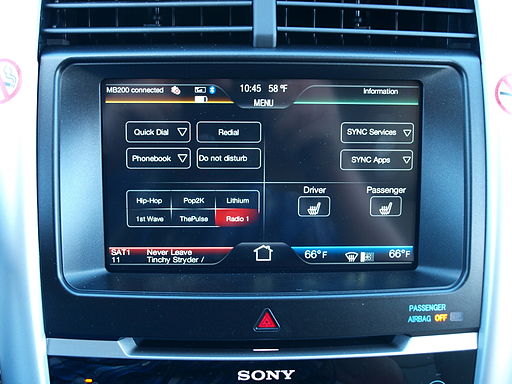Self-Parking Cars, Green Dealerships, and Robot-Auto-Talk
 |
| Photo of MyFord Touch by Randy Stern |
by Frank Wood
Imagine your car being able to drive itself. Companies like Google are already starting to make this a reality, among other groundbreaking technologies. Some future trends for cars might end up being as common as air conditioning, while others will taper off into obscurity. Either way, half the fun is speculation. From the evolution of green vehicles to technological advancements, the future of cars is quickly becoming the present.
Emissions in the Future
Emissions, and the amount or type of fuel a car uses, is a notable and continually popular trend. The hybrid has gone from a car you’d see every so often to a highway staple. "Green" dealerships are also popping up more abundantly as well as larger selections of eco-friendly vehicles. For example, SmartWay certified vehicles are offered at DriveTime dealerships and car lots across the country. Most cars now have their own hybrid counterpart, partly due to trends in society, outrageously high gas prices and the government forcing the auto industry to change. While hybrid automobiles still rely on gasoline combined with electricity, there are a greater number of electric cars on the road now as well, with some state governments offering rebates for those who make the switch. While the infrastructure for the electric car hasn’t totally been set up yet, many electric car companies are suffering financially. Tesla motors has seen a slight rise in sales, but other major electric car manufacturers like the Fisker Automotive Inc. have experienced major drops in numbers, ABC News reported.Technological Advancements
Beyond the fuel efficiency that will save us money and help protect the environment, technical connectivity advancements are evolving exponentially. There are a number of partially evolved smart cars already, like the Lexus LS460, which can parallel park itself. Many other models are in development, designed to make decisions for the driver and passenger. Advances in vehicle technology are ideally making trips safer and easier while cutting down on human error that causes traffic and accidents. There are, however, pros and cons. Fords will soon have a feature called MyFord Touch, which is a piece of equipment that turns the dashboard of your car into a touch-sensitive screen. As amazing as this sounds, dangerous distraction is imminent. The creators of all of this new technology understand this danger. Therefore, they have also added voice recognition for just about everything you can do in a car—except for press the gas and brakes—allowing you to keep you hands on the wheel and eyes on the road.With all of these new conveniences, there's a lot to gain, but there are disadvantages as well. Always using a navigation system to tell you where you are going may keep you from learning neighborhoods or basic directions in the city that you live in. The further computerization of vehicles may also increase the chance of hackers accessing your car. While smart car tech may free up time for our minds to do other things, technological advancement always has unforeseen consequences. All in all, the future of transportation looks promising.
Frank Wood: Frank follows the latest tech trends in the smart car auto industry. He shares the latest in hybrid and alternative fuel cars with his readers.